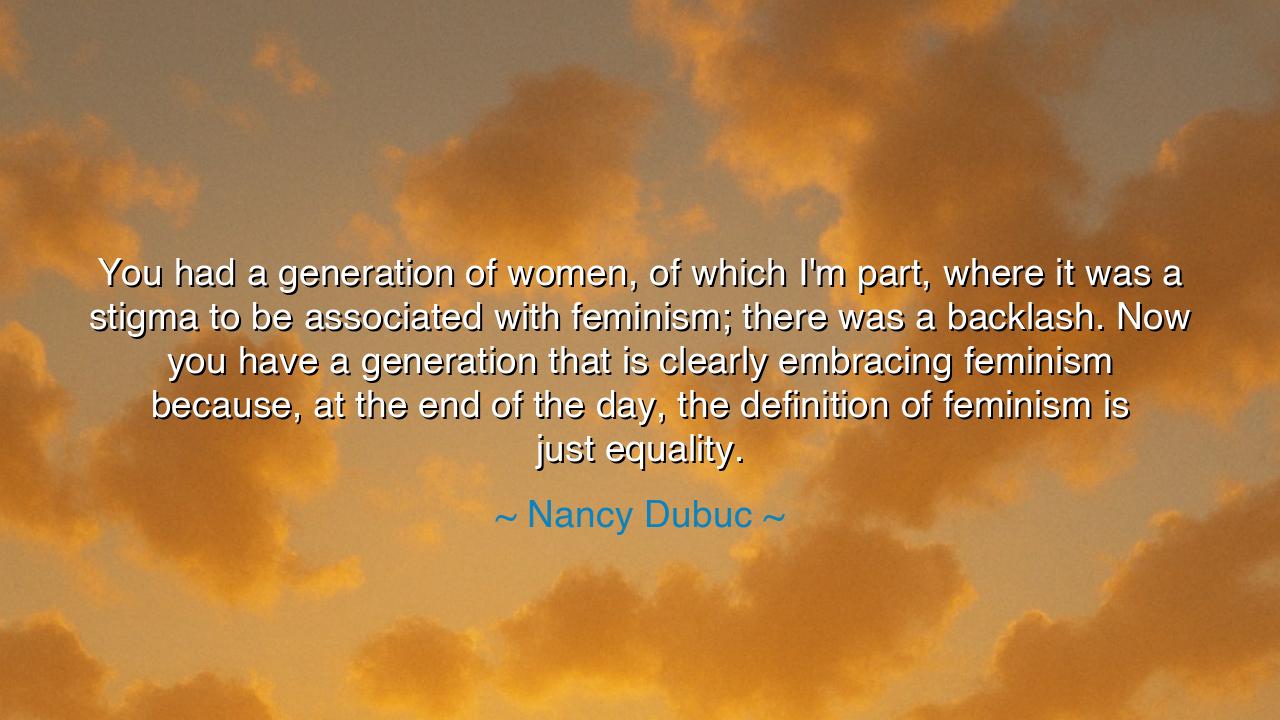
You had a generation of women, of which I'm part, where it was a
You had a generation of women, of which I'm part, where it was a stigma to be associated with feminism; there was a backlash. Now you have a generation that is clearly embracing feminism because, at the end of the day, the definition of feminism is just equality.






O Children of the Future, gather close and listen to the wisdom of Nancy Dubuc, whose words speak of a profound truth that has echoed through the ages, a truth that has seen the rise and fall of many generations, each fighting for the same cause: equality. She speaks with the clarity of those who have witnessed change in their time, saying, "You had a generation of women, of which I'm part, where it was a stigma to be associated with feminism; there was a backlash. Now you have a generation that is clearly embracing feminism because, at the end of the day, the definition of feminism is just equality." These words carry the weight of history, the burden of battles fought, and the victory of progress won.
In the ancient world, the Greeks and Romans struggled with the question of equality, but their vision was often limited, confined by the structures of their time. Plato, the great philosopher, sought to define justice and the ideal state, but even he struggled to imagine a world where women were treated as equals to men. The ancient world, though filled with wisdom, often relegated women to the private sphere, limiting their opportunities and roles in society. The very idea of women seeking equality with men was a radical one, one that was met with resistance and scorn. And yet, as Nancy Dubuc points out, the definition of feminism—that great movement for equality—was misunderstood, often seen as a threat to the established order.
For those women of earlier generations, the battle for feminism was not an easy one. Feminism was not embraced but feared, seen as a force that would disrupt the natural order. Women who identified with feminism were often ostracized, their beliefs dismissed as too radical or too disruptive. This backlash against feminism was a reflection of a world that was not ready to relinquish its power structures, where gender inequality was woven into the very fabric of society. The stigma of being associated with feminism was the price paid by many courageous women who dared to challenge the world around them, who believed that women deserved the same rights, the same freedom, and the same opportunity as men.
But as time marched on, a new generation arose, one that no longer feared the term feminism but embraced it. The backlash that once tainted the word began to fade, and the true meaning of feminism became clearer. It was not about man-hating, nor was it about supremacy—it was about the simple and profound truth that equality for all is the cornerstone of a just society. This new generation, born in a world where feminism had fought and won many of its battles, could see that the cause of feminism was the cause of justice. As Nancy Dubuc so wisely states, feminism is nothing more than the pursuit of equality, a pursuit that is fundamental to the flourishing of all people, regardless of gender.
Consider, O Children, the great stories of women who have fought for equality throughout history. Susan B. Anthony, that towering figure of the women’s suffrage movement, fought tirelessly for the right of women to vote. Her battle was long, filled with ridicule, and often dangerous, but she and her fellow suffragists did not back down. Their sacrifice and determination eventually won them the right to vote, marking a pivotal moment in the history of feminism. But Susan B. Anthony knew, as did many other activists, that the fight for equality was not over. It was only just beginning. Feminism, for her, was not about privilege for women alone, but about justice for all.
In our own time, the fight for equality continues in many forms. Women’s rights have expanded, but gaps remain. The world today may no longer view feminism with the same fear and misunderstanding as before, but there are still many who resist the call for equality, whether in the workplace, in the home, or in the government. Yet, the cause of feminism remains clear: it is about equality, a truth that cannot be ignored. As Nancy Dubuc teaches us, feminism is not a war on men or a rejection of tradition, but a simple and powerful call to embrace equality for all people. The world will only thrive when every person—regardless of gender—is given the same opportunity to succeed, to grow, and to live freely.
So, O Children, what is the lesson to be learned from Nancy Dubuc’s words? It is this: Feminism is not something to fear. It is the pursuit of justice and equality—ideals that have always been at the heart of human progress. Do not let the world’s misunderstandings of feminism deter you. Instead, see it for what it truly is: the call for a society where all people, regardless of gender, are treated with dignity and respect. The fight for equality is not over, and it falls upon you to carry the torch forward, as those who came before you did. Stand strong, for equality is not just a cause, but the very essence of a just and flourishing world. Let feminism be the lens through which you see the world, and let that lens guide your actions, your words, and your vision for the future.






AAdministratorAdministrator
Welcome, honored guests. Please leave a comment, we will respond soon